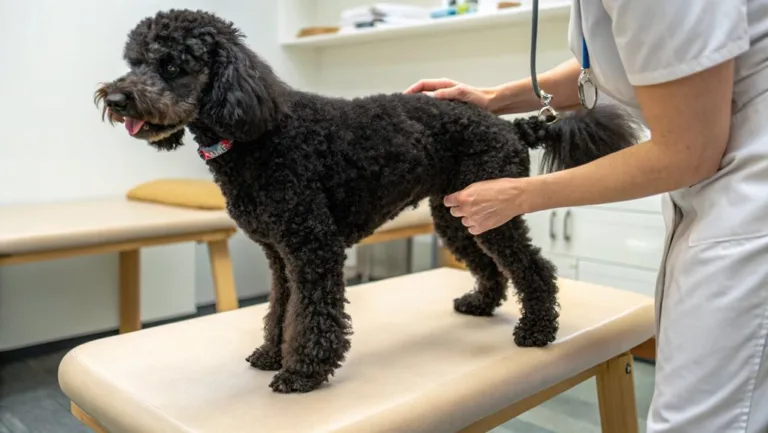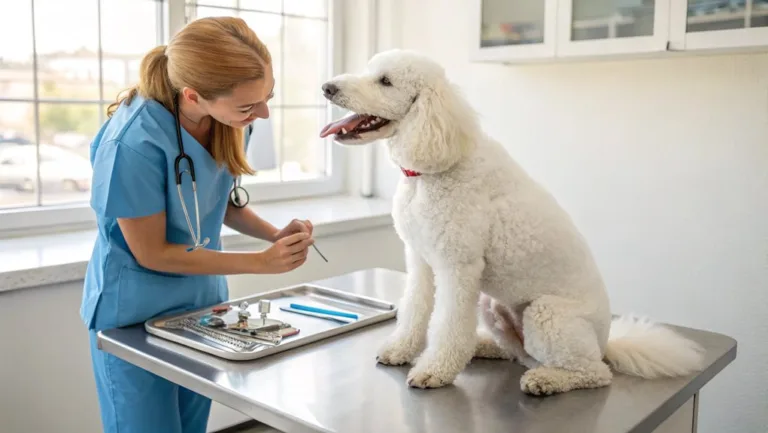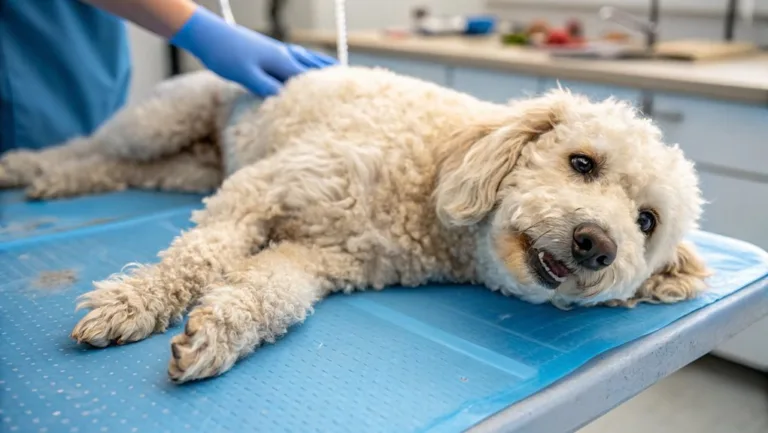A Guide to Epilepsy in Poodles

Canine epilepsy in Poodles is a manageable neurological condition that causes recurring seizures due to abnormal brain activity. While seizures can be scary to witness, most epileptic Poodles live happy, full lives with proper care and medication.
Common signs include sudden stiffening, muscle spasms, collapse, and temporary post-seizure confusion. Treatment typically involves daily anti-seizure medications, maintaining a consistent routine, and creating a safe home environment.
Regular veterinary check-ups, detailed seizure diaries, and awareness of potential triggers like stress or loud noises are essential for effective management. Understanding your Poodle’s unique needs will help you become a more confident and capable caregiver.
Key Takeaways
- Poodles have a genetic predisposition to epilepsy, characterized by recurring seizures that can range from mild focal to severe generalized episodes.
- Common seizure symptoms include sudden body stiffening, uncontrolled movements, collapse, excessive drooling, and temporary post-seizure confusion.
- Treatment typically involves daily anticonvulsant medications, maintaining consistent routines, and regular veterinary monitoring to adjust medication as needed.
- Keep a detailed seizure diary noting frequency, duration, and potential triggers to help veterinarians develop effective treatment plans.
- Create a safe environment by removing hazardous objects and providing quiet spaces for post-seizure recovery.
Understanding Canine Epilepsy

Canine epilepsy is a neurological disorder characterized by recurring seizures that affect dogs, including Poodles, due to abnormal electrical activity in the brain. This condition can be either inherited or acquired, with epilepsy genetics playing a significant role in how the disorder manifests across different Poodle lines.
Research has shown that certain Poodle families may carry genes that make them more susceptible to developing epilepsy.
Throughout breed history, Poodles have been recognized as one of several purebred dog breeds with a higher predisposition to epilepsy. While this might sound worrying, it is crucial to observe that not all Poodles will develop the condition.
When seizures occur, they can range from mild to severe, with some dogs experiencing what’s known as “focal seizures” affecting only part of the body, while others may have generalized seizures involving the entire body.
The good news is that with proper veterinary care and medication, many epileptic Poodles live happy, full lives. Understanding the signs and triggers of seizures helps owners provide better care and support for their furry friends.
Common Signs and Symptoms
Recognizing epilepsy symptoms in Poodles requires careful observation of both behavioral and physical changes. Common signs include sudden stiffening of the body, uncontrolled muscle movements, and collapse. Poodles may also drool excessively, lose bladder control, or paddle their legs during an episode.
Before a seizure, owners might notice their Poodle becoming anxious, restless, or clingy. Some dogs seek out their owners or hide, showing they sense something is about to happen.
After the episode, dogs often appear confused, tired, or temporarily blind – a phase called the post-ictal period.
Seizure frequency can vary greatly among affected Poodles, with some experiencing episodes weekly while others might go months between seizures. Due to genetic predisposition, Standard Poodles are more commonly affected than other varieties.
Keeping a detailed diary of seizure activity helps veterinarians develop effective treatment plans.
Watch for subtle changes in your Poodle’s normal behavior, like sudden confusion, vacant staring, or unusual jaw movements. These might be minor seizures that are easy to miss but important to document for proper diagnosis and care.
Triggers and Risk Factors

Understanding epilepsy triggers in Poodles involves identifying both environmental and physiological factors that can increase seizure risk. While genetic predispositions play a significant role, various environmental influences can also trigger seizure activity in susceptible dogs. Being aware of these triggers helps owners better manage their Poodle’s condition.
| Trigger Category | Common Examples | Prevention Tips |
|---|---|---|
| Physical Stress | Exercise, Heat, Illness | Monitor activity levels, avoid overexertion |
| Environmental | Loud noises, Bright lights | Create calm spaces, reduce exposure |
| Chemical | Medications, Toxins | Follow vet prescriptions, secure household chemicals |
| Dietary | Food allergies, Sugar spikes | Maintain consistent feeding schedule |
| Emotional | Anxiety, Excitement | Establish routines, minimize stressful situations |
Several factors can increase a Poodle’s risk of developing epilepsy. Some bloodlines carry a higher genetic predisposition, making it essential for breeders to screen their breeding stock carefully.
Age also plays a role, with most cases first appearing between 6 months and 3 years. Calming pheromone diffusers can help create a soothing environment for epileptic Poodles. Regular veterinary check-ups, maintaining a stable routine, and avoiding known triggers can help reduce seizure frequency in affected dogs.
Positive reinforcement training can help create a stable environment that minimizes stress-related seizure triggers.
Diagnosis and Testing Methods
When veterinarians suspect epilepsy in Poodles, they employ a thorough diagnostic approach that involves multiple testing methods. The process typically begins with a detailed medical history, including information about seizure frequency, duration, and any potential triggers the owner has noticed.
Blood tests are usually the first diagnostic tool, helping rule out other conditions that might cause seizures, such as liver problems or infections. Veterinarians may also recommend genetic testing, particularly important for Poodles since epilepsy can run in family lines. Just as with coat color testing, understanding genetic markers can provide valuable insights into inherited conditions.
These tests can identify specific gene mutations associated with inherited forms of epilepsy.
Imaging studies, including MRI and CT scans, allow veterinarians to examine the brain’s structure and detect any abnormalities that might cause seizures. Sometimes, they’ll also perform an electroencephalogram (EEG) to measure brain wave patterns.
While these tests might seem overwhelming, they’re essential for accurate diagnosis.
Your vet might also recommend additional specialized tests based on your Poodle’s specific symptoms and medical history. Remember, getting a proper diagnosis is vital for developing an effective treatment plan that will help your furry friend live a happy, healthy life.
Regular monitoring and veterinary check-ups are necessary for managing epilepsy, just as they are for other chronic conditions like sebaceous adenitis.
Treatment Options for Poodles

Treatment options for epileptic Poodles have evolved substantially over the years, offering multiple approaches to manage seizures effectively. The foundation of treatment typically begins with regular vet consultations to establish an individualized care plan.
Most Poodles respond well to anti-seizure medications, though finding the right balance often requires patience and careful medication adjustments.
Common treatment strategies include daily anticonvulsant medications, which help reduce both the frequency and severity of seizures. Your veterinarian might prescribe medications like phenobarbital or potassium bromide as first-line treatments. Some Poodles may need a combination of medications to achieve ideal control.
Along with medications, maintaining a consistent daily routine and reducing stress can make a big difference in seizure management.
It’s important to keep a detailed seizure diary to help your vet make informed medication adjustments. Many Poodle owners find that complementary approaches, such as a regular feeding schedule and calm home environment, support traditional medical treatment.
While epilepsy is a lifelong condition, most Poodles can enjoy a happy, active life with proper management and care.
Living With an Epileptic Poodle
A Poodle’s daily life with epilepsy requires thoughtful adjustments and consistent care from their owners. Diet adjustments often include switching to high-quality, brain-supporting foods and maintaining regular feeding schedules.
Many families find that lifestyle changes, such as creating a calm environment and establishing consistent routines, help reduce seizure triggers. Regular veterinary check-ups are crucial for monitoring seizure patterns and adjusting treatment plans as needed.
Since standard poodles can take up to 15 months to reach maturity, extra care must be taken during their extended developmental period.
| Daily Care Essentials | Safety Measures | Wellness Activities |
|---|---|---|
| Medication Schedule | Padded Furniture | Gentle Exercise |
| Regular Meal Times | Seizure Journal | Stress-Free Play |
| Quality Rest Periods | Safety Gates | Mental Stimulation |
Managing an epileptic Poodle becomes easier when families establish a reliable daily rhythm. Simple modifications like removing unsafe objects, creating safe spaces, and maintaining a predictable schedule can make a significant difference.
It’s encouraging to know that most epileptic Poodles can enjoy happy, active lives with proper management. Keep a positive attitude while remaining vigilant about monitoring your pet’s condition, and don’t forget to celebrate the good days with your furry friend.
Emergency Care During Seizures

Responding to a Poodle’s seizure requires quick thinking and careful actions to guarantee the dog’s safety. Understanding proper seizure first aid can make a significant difference in managing these stressful episodes.
The key is to remain calm and create a safe environment for your Poodle while the seizure runs its course.
When your Poodle experiences a seizure, follow these essential safety measures:
- Clear the area around your dog, removing furniture or objects that could cause injury during involuntary movements
- Keep your hands away from their mouth, as contrary to popular belief, dogs cannot swallow their tongues
- Note the time the seizure begins and ends to report to your veterinarian
Standard size poodles are more susceptible to developing Addison’s disease, which can sometimes trigger seizure episodes.
Post seizure care is equally important for your Poodle’s recovery. Your pet may seem disoriented or tired after the episode, which is completely normal.
Keep them in a quiet, comfortable space and monitor their behavior. Offer small amounts of water once they’re alert enough to drink, but don’t force it.
Most Poodles will return to normal within a few hours, though they might be temporarily unsteady on their feet or seem confused.
Maintaining a consistent daily routine can help reduce stress and anxiety that might trigger seizure episodes.
Conclusion
While epilepsy in Poodles presents significant challenges, proper management and care can help affected dogs live fulfilling lives. Through early diagnosis, appropriate medication, lifestyle adjustments, and vigilant monitoring, seizure frequency and severity can often be reduced.
Working closely with veterinary professionals, maintaining detailed health records, and creating a safe environment are essential steps. With dedication and proper support, epileptic Poodles can enjoy happy, active lives as beloved family members.






